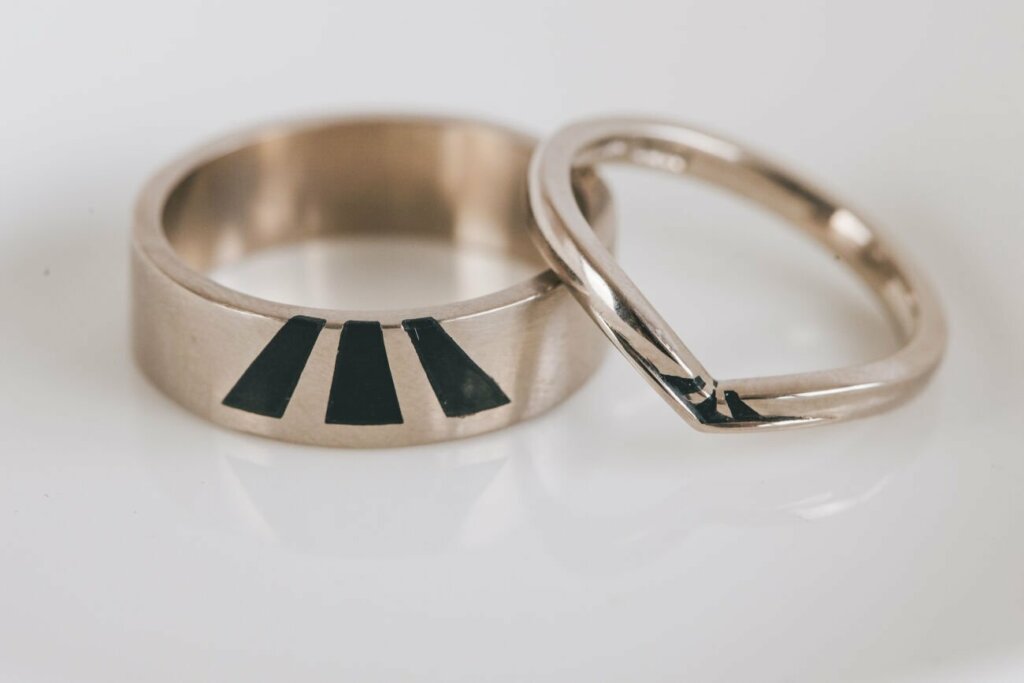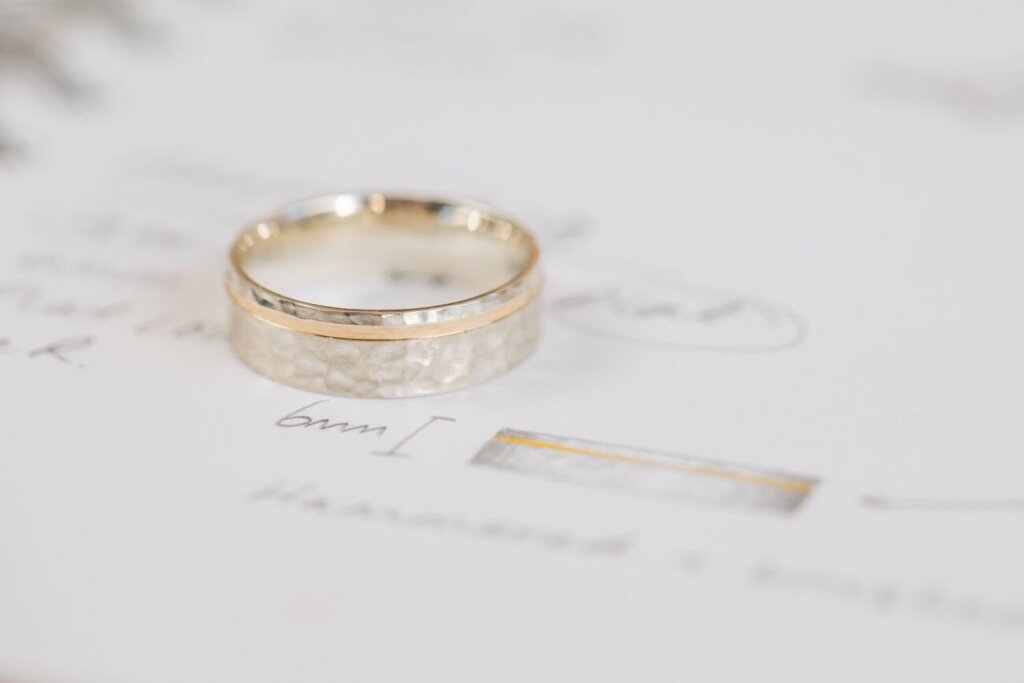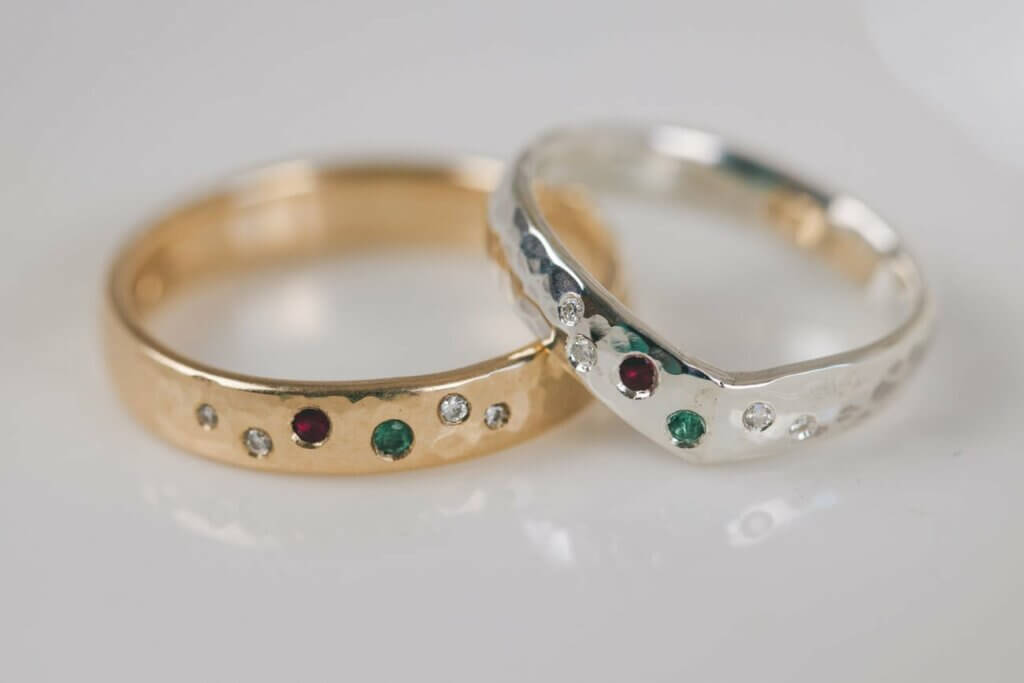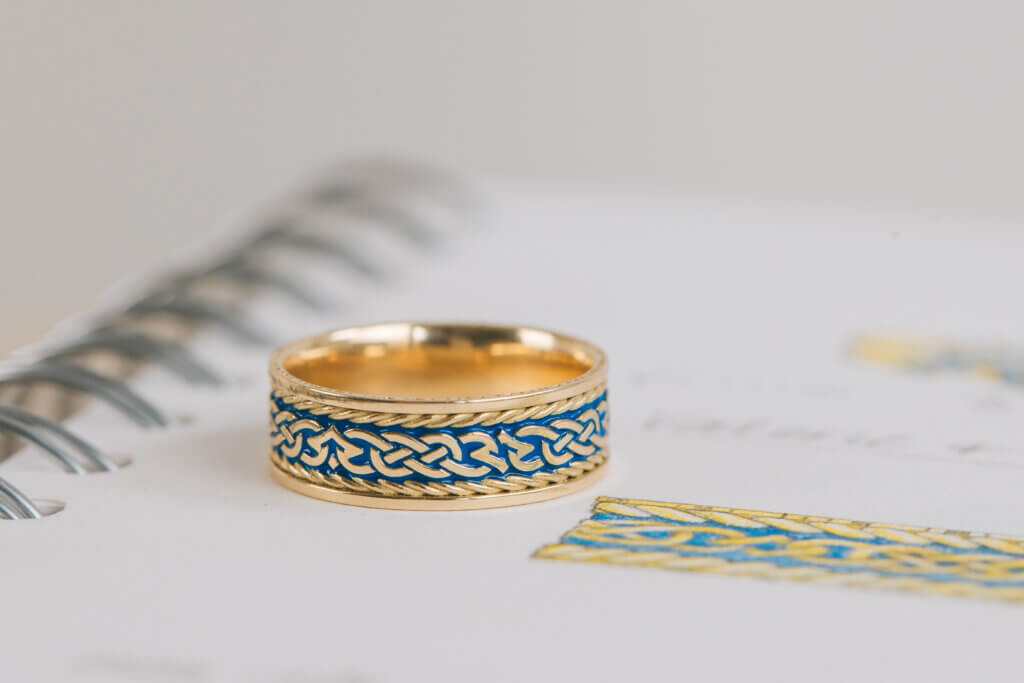Each time I attend a wedding show and chat to couples about their plans for wedding rings, I will come across numerous grooms (generally speaking, occasionally brides too) who are eyeing up industrial metal wedding bands, e.g. titanium or tungsten.
Industrial-style wedding rings are everywhere right now. Start looking at wedding rings online and you’ll be inundated with adverts for ‘indestructible’ rings, as if precious metal bands haven’t stood the test of time for all couples before this current generation.
Titanium or Tungsten wedding rings can look ultra-modern, and perhaps a bit alternative. For couples drawn to something bold and different, the aesthetic is undeniably compelling.
But when you’re investing in a wedding ring that is meant to last not just for years, but generations, there are a few things worth considering before you go down this route.
In short, industrial metal rings are a modern invention and not one I recommend – read on to find out why, and what I suggest instead.

The Key Limitations You Should Know
Here are the main factors that make industrial metals less favourable (in my personal opinion), particularly for wedding bands that are meant to be heirloom pieces:
1. Resizing and Repair-ability
Many of the industrial metal alloys or ultra-hard finishes simply cannot be resized or repaired. For example, a ring in ultra-hard tungsten-carbide alloy might hold its polish, but if you ever need to change size (as fingers often do over time) it will not be possible, and instead, you will have to replace the ring with a new one in a different size. This means you won’t be wearing the ring you exchanged when you said your vows, which is a real shame.
2. Brittleness and Unexpected Risk
The very properties that make some industrial metals “tough” also mean they behave less forgivingly under stress. Tungsten bands are extremely hard but in some conditions they can crack or shatter under impact rather than bending. That means rather than giving slightly and perhaps needing a minor repair, they might break, which is something you want to avoid when your ring is a symbol of lifelong commitment.
3. Hardness can be a bad thing
The innate softness of gold makes the perfect and ‘safe’ choice for a ring. Should the worst happen and you suffer a trauma to the hand, yes, your ring may cause some damage to your skin, but an unforgiving metal such as titanium may actually deglove your finger.
4. Finish, Wear and Aesthetics Over Time
While industrial metals often come in dramatic finishes (blackened, gun-metal, laser-etched, etc) there can be downsides. The finish may scratch, or reveal a different base colour underneath (for example oxidised zirconium may reveal a lighter grey if the surface layer is damaged). Because refinishing may be difficult (or impossible), the ring may not age as gracefully or be able to be refreshed in the way more traditional metals can.
5. Symbolic and Emotional Longevity
A wedding ring is not just a piece of jewellery – it’s a symbol. It is intended to last, to carry memories, and to be passed down. In my bespoke jewellery world, I believe in metals and craftsmanship that allow for lifetime wear, for adaptation (resizing, repairing), and for gentle patina that holds character, let alone the scope for a totally unique design that represents you and your relationship. Traditional precious metals like gold and platinum offer that flexibility more naturally. Choosing a material that may limit that adaptability can mean the symbol holds less flexibility for the future. Industrial metal rings are mass produced on mass and therefore your ring is not unique.
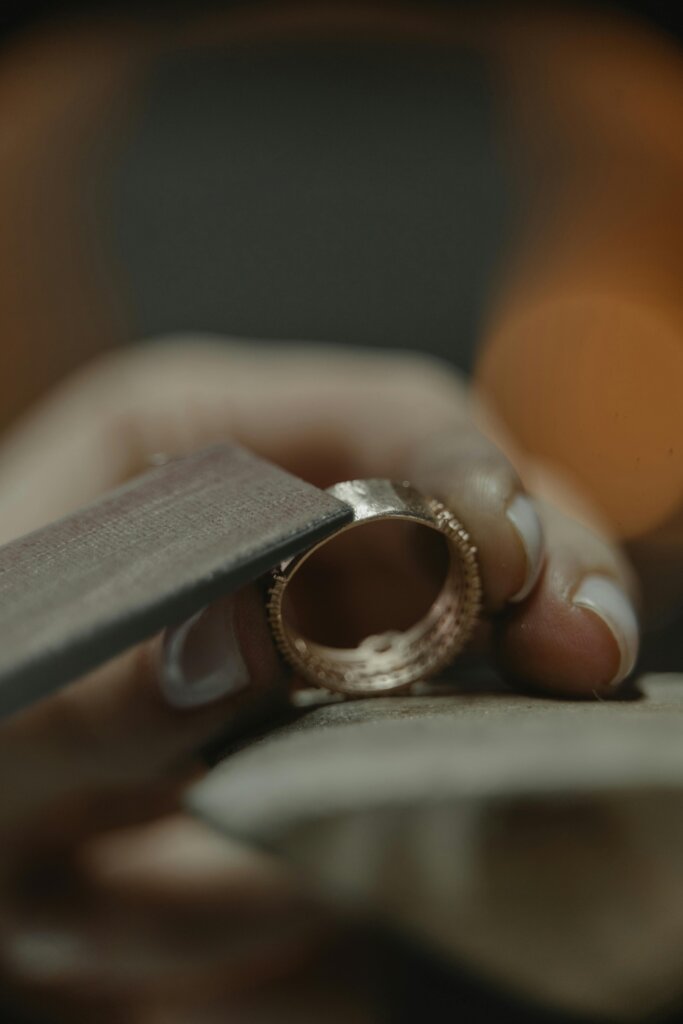
When Might an Industrial Metal Ring Be Appropriate?
I’m not saying they’re always the wrong choice. There are scenarios where they might fit a couple’s style and priorities. For instance:
- If you’re a couple whose style is decidedly bold, modern, alternative, and you never plan to resize or rework your ring.
- If you treat the ring more as a bold fashion piece rather than a traditional heirloom symbol.
But if your aim is to have a ring that becomes part of your legacy, I believe a more traditional precious metal, or a thoughtfully crafted bespoke piece in classic materials, is the better choice.
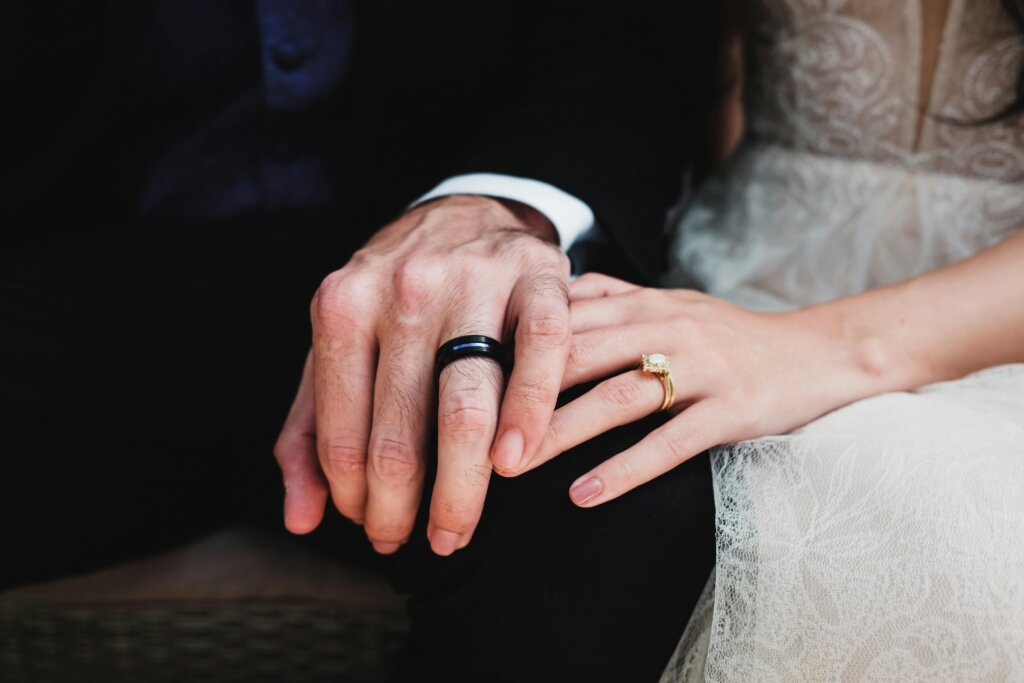
My Recommendation for Couples
- Prioritise a metal that can be resized and repaired.
- Think about how your ring will look and feel 5, 10, 20, 30 years from now, not just when you first try it on. Precious metal bands are timeless, whereas those black bands are a trend that may not age so well.
- If you do love the industrial look, consider achieving the look with darker metals such as 18ct white gold, which has a beautiful gun metal tone. Black can be incorporated with black rhodium plating – I recommend this is kept to low elements of the design for longevity. We can even utilise enamel or gemstones to introduce any colour of your choosing.
- Work with a jeweller who’s transparent about all the trade-offs of material choices. Education is a huge part of my job and I will always discuss the long game with you when we select different elements for your design.
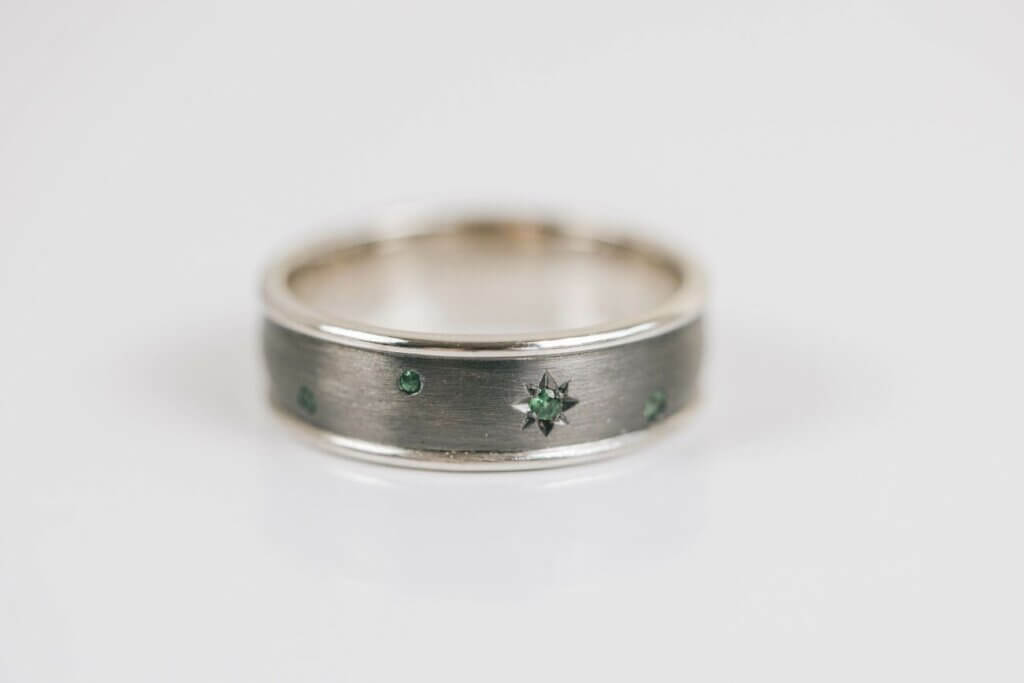
Conclusion
As someone who creates bespoke wedding and engagement jewellery, and values the idea of rings that reflect unique stories, enduring craftsmanship, and future adaptability, I steer couples away from industrial metal wedding rings for the reasons above. They may look intruiging, and my word, the marketing for them is intense, but if you’re choosing a ring to carry through your life (and to pass down the generations) I believe a traditional precious metal band will almost always offer a more appropriate home for your story.
If you’re drawn to an industrial aesthetic, let’s talk through your priorities and find a way to incorporate that style within a material that supports your long-term legacy. You deserve nothing less.
